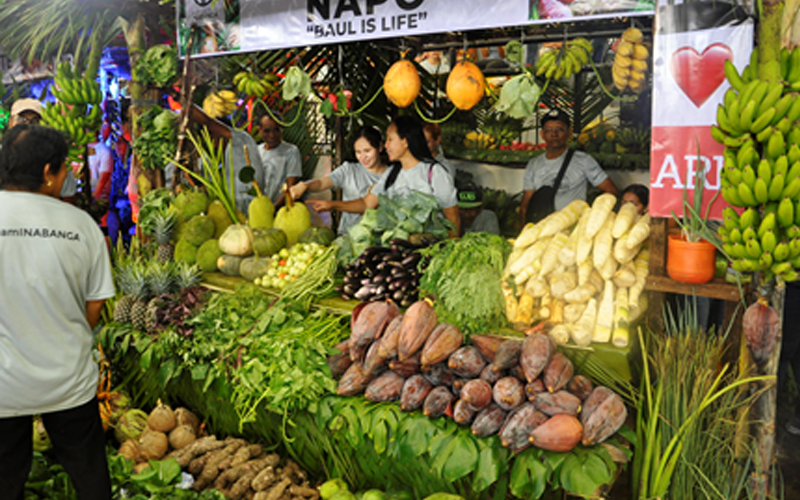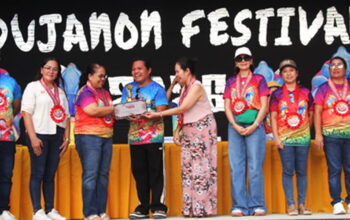
BAUL is life, utanon is lifer.
In Inabanga, Bohol, baul is life, but utanon is lifer. Or so, they say.
As baul in Tagalog means a treasure chest, in Bohol, interestingly baul or baow is a farm lot, which to some point, means life or death to one who has the inclination to plant or not.
In a town that is still straddled with poverty and hunger especially compounded by the effects of the pandemic, familieshere in Inabanga are taking matters into hands.
Assuring sufficient and the right food for their kids has become a priority with recent survey saying one of every five Filipinos suffer of hunger and malnutrition, which can adversely affect productivity, Inabangnons, in partnership with the local government unit and a consortium of organizations into community based development jointly put up Advancement for Rural Kids (ARK) by solving hunger and securing their food for life.
Families in communities join the ARK Feed Back, 8-week vegetable exchange which engages families to plant vegetables in their backyards and bring at least three kinds of vegetables to the barter market, so they can take home an assortment of bartered vegetables enough to prepare for 3 – 5 meals for 4-5 people in the family.
Also inspired by old people in the town who still continue to make vegetable farms, Mayor Jose Jono Jumamoy said through engaging his people to plant vegetables, they are assured everyone is fed right, families and kids are more inclined to get back to school and work, to afford them a much better chance in the future.
Vegetable farms, or even gardens help us improve our agriculture and food security where everyone is assured to be fed the most nutritious freshest and healthiest from the gardens, he added during the 8th-week of the project and the culmination activity billed as Utanon Summit.
A town blessed with the occasional inundation of the Wahig-Pamacsalan River, Inabanga has got rich soil that can support vegetable farms which the families, the consortium and the LGU in partnership with barangay governments fund and develop ‘baul (baow) sa tagsatagsa ka pamilya,’ (vegetable farms for every family).
Here, baul is life, the program theme states, underscoring the long history of farming in the town that used to be into organized farming with the Jesuits in the 17th century.
But while every baul may concentrate on crops which would be staple for Boholanos, Inabanga’s modern baul, which also translates to treasure chest in Tagalog, is concentrating on vegetables and fruits.
In the first Utanon Summit (vegetable summit) showcasing the harvest after seven months of project implementation, the town authorities reported some 3,222 families getting regularly fed for the duration, despite the beginnings of a drought that has been damaging crops elsewhere in Bohol.
At certain times, we have to fetch water some 200 meters and bring them up the farm, using containers, if only to make sure the vegetables survive, and we can have food for the barter, shared a mother who gets some help from her kids.
Solbad gyud ang among problema sa sud-anon Sir, gani, mas himsog kay permi na man lang utan, she added.
Here, while most family members tend to the farm, while fathers work elsewhere, the mothers, who are left to take care of the kids have found what used to be additional work, now as a pastime and bonding moment with their kids.
Every few days in a week, we harvest at least three kids of vegetables from our garden and bring them to the purok center where ARK weighs our harvest and divides them into shares. As we come, we are also allowed to pick from any of the assorted vegetables that our neighbors also bring for barter. They pick some of ours, we pick some of their’s.
And to make sure that these vegetables are prepared right, the town also ran a cooking contest in barangays to showcase the most nutritious, best preparation and presentation of prepared food.
In the past 7 weeks, Inabanga families have all generated over a million in barter cost, allowed an average of 4 kilos of vegetables one brings home during the barter and a total harvest weight of over 60,000 kilos.
And certainly enough, with the occasional flooding, communities along the riverbanks have in fact, thought of ways to continue farming, to still get access to food during disasters.
Here, communities thought of coming up with floating gardens, ones that are using recycled pots loaded in bamboo rafts, some gardens sporting trellises that allow vine vegetables to grow.
In response to flooding and the challenges of global warming, our people are exploring possibilities to seek out solutions to our local problems, Mayor Jumamoy shared.
Now at the end of the first cycle, Inabanga Vice Mayor Jumamoy said they are putting up leverage funds to that ARK Feedback could continue and expand to the 34 other barangays in town.
ARK Feedback representative of Chief Operating Officer Ayesha Vera-Yu as well as consortium members shared their excitement for discovering a model that would solve the problem of hunger sustainably.
Vera-Yu, who spoke via teleconferencing, picked Inabanga’s innovations, the people’s talents and brilliant ideas, especially in working for themselves in solving their problems.
During the Utanon Summit, Inabanga organized Vegetable Booth competition for the 16 ARK Barangays, cheering contest, Soltera sa Utanon complete with candidates in Production Number, Vegetable Gowns, Darling of the Crowd, and Question and Answer Portion.
The day was also set for the awarding of barangay showcased vertical gardens winners, Floating Gardens Contest Winners and other fun activities.
It is as if the DNA is there, people of Inabanga said they have to sustain as they know they have to sustain themselves in life, nurtured by tINABANGAy. (PIA-7/Bohol)


